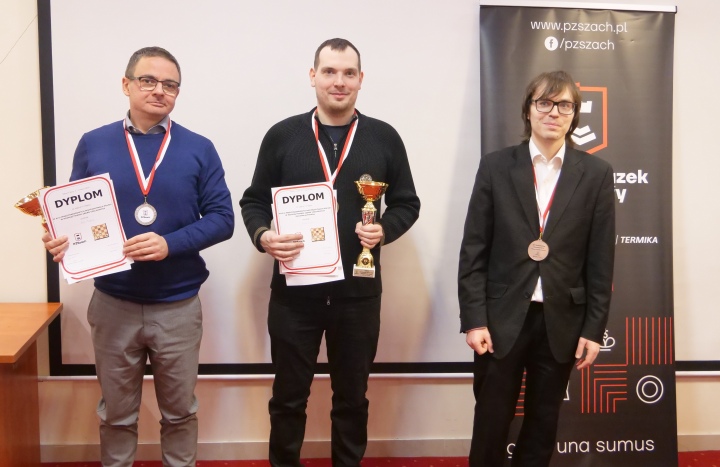In Poland, eight minutes decided the winner; in the Netherlands, one subtle endgame study made the difference.
The series of open national competitions for the World Solving Cup 2022/23 started in October 2022, with the Swiss championship won by Martinas Limontas (Lithuania). Then, in February, Dolf Wissmann (Netherlands) came out on top in Finland, and March began with the win for the Nikos Sidiropoulos of Greece in the Netherlands.
The Polish championship, held in Sękocin Stary, the suburbs of Warsaw, was the test for domestic pride. Will the most successful nation in chess solving, with 12 titles in World Championship (WCSC) and five in European (ECSC) since 2009, allow any foreigner to win on Polish soil?
It was the strongest national tournament since 2020, with 2425 points average solvers rating of the top ten, among the 28 participants from Great Britain, Lithuania, Poland, Slovakia, Ukraine, and Poland. Many titled solvers took part in this competition: Valery Kopyl, Martynas Limontas and Piotr Górski with single medals from World Chess Solving Championship, and two multi-medalists: Piotr Murdzia (8 times World champion, 16 medals altogether) and Kacper Piorun (5 times World champion, nine medals altogether). Vasil Ďačuk from Ukraine, the current individual World champion in composing, selected the 18 problems to be solved during six rounds and conducted the competition.
 Solvers focused before the first round: Kacper Piorun (left) and Piotr Górski (right) in the first rows | Photo: Piotr Górski
Solvers focused before the first round: Kacper Piorun (left) and Piotr Górski (right) in the first rows | Photo: Piotr Górski
In the end, as many expected, it boiled down to the battle of Murdzia and Piorun. On the 1st day, both gained equal points after solving all the two-movers and three-movers perfectly and getting the best (but not maximal) result in the round of studies. Kacper was ahead by 14 minutes.
On the second day, both had identical results in help-mates, more-movers and self-mates. Thus, time became the decisive tiebreaker. Piotr, the record holder with 22 domestic titles, managed to catch up by 6 minutes, but it was not enough to close the cap. The total available time was 360 minutes, and Kacper Piorun became the Polish Solving Champion thanks to the 8 minutes difference!
After the 1st day, no less than 11 solvers had about the same chances for the remaining third place on the podium. While the first two were not a surprise, no one expected 17-year-old Kevinas Kuznecovas from Lithuania to get the bronze medal. On the way to it, Kevinas obtained his final FIDE Solving Master norm (for achieving it a solver needs a performance rating of at least 2450 and the highest rating of at least 2350 points).
He was followed closely by another Lithuanian, Martynas Limontas, the current leader in the WSC Standings. The 2019 World Champion, Piotr Górski, was only 11th after the 1st day, but the 2nd day elevated him to 5th place and the bronze medal in the Polish national classification. As one of the main organizers, he was under triple pressure, expecting the birth of his sixth child. The happy event came already the next day, and Piotr Górski became the sole “kids champion” among the World champions in solving, surpassing the “record” of the German Michael Pfannkuche.
 Best Polish juniors: Szymon Boryna (bronze), Michał Koziorowicz (gold), Radosław Psyk (silver), and the main judge Vasil Ďačuk
Best Polish juniors: Szymon Boryna (bronze), Michał Koziorowicz (gold), Radosław Psyk (silver), and the main judge Vasil Ďačuk
Another exciting rivalry was among the best Polish juniors. In November 2022, Radosław Psyk and Michał Koziorowicz became the Polish OTB U20 champion and vice-champion, respectively. In solving, however, Michał successfully defended the junior gold medal, and the bronze went to Szymon Boryna.
In the following table, you will find the results of the top 10 solvers.
Final standings:
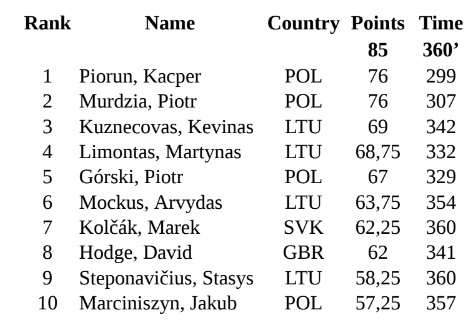
The full results are available here.
The next two problems were among the hardest nuts to crack:
1
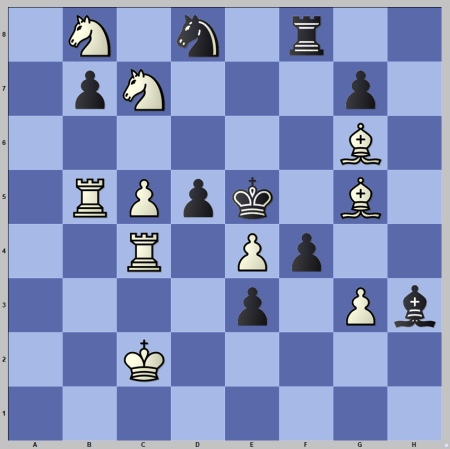 White to play and mate in five moves
White to play and mate in five moves
In the starting position, white has a strong move 1. Bf5. This kind of sacrifice with double threat, known as Novotny interference, stops Black’s f8-rook from preventing 2. gxf4# and h3-bishop from averting 2. Nd7#. Taking White’s bishop on f5 does not help. However, 1. Bf5? is not a solution because of 1…dxc4!
Hint: Can we allow Black’s king to move to d4?
This year, even for some of the best solvers in the world, 100 minutes was too little time to solve three endgames completely. The best result was 6 points out of possible 15, and each of the medal winners got full 5 points for a different endgame! The next one was fully solved only by the overall winner Kacper Piorun, and Jakub Marciniszyn (10th place), with all others not getting even a single point:
2
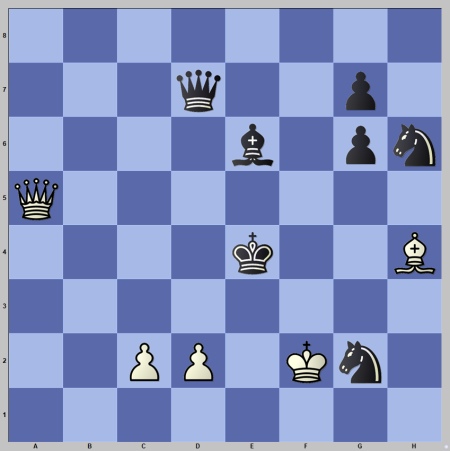 White to play and win
White to play and win
White is two knights down, but Black’s king can be trapped using the white pawns. The first move seems natural 1. d3+. How should white proceed later? For instance, 2. Bd8 (threatening 3. Bb6#) is met with: 2… Ng4+ 3. Ke2 Nf4+ 4. Kd2 Nd5! (and even stronger 2…Qf7+!). Black knight on d5 stops all checkmate attempts.
Hint: How can White prevent the black knight from reaching d5-square?
The Dutch Solving Championship took place the same weekend as the Polish one, but the overall atmosphere was very much different. In the nice town of Nunspeet, in the middle of the Netherlands, more than 30 people participated in the yearly gathering of the Dutch problemists, where the national championship was only a part of an extensive program that included lectures, composing tourneys, and unofficial solving competitions.
 Nicely decorated solving hall in Nunspeet | Photo Luc Palmans
Nicely decorated solving hall in Nunspeet | Photo Luc Palmans
The 28th edition of the Dutch Open Solving Championship brought together 18 participants in the A-group and 9 in the B-group. The conditions were perfect: big tables, spacious room, no disturbing noise and refreshments at hand.
Nikos Sidiropoulos from Greece, who resides in Belgium, has been consistently improving lately. This time, he managed to edge out the favourite Eddy Van Beers just behind him. Third place went to the Slovak Richard Dobiaš, who lives in the Grand Duchy of Luxembourg, followed by two-time World Champion Michel Caillaud of France, a regular participant at Nunspeet. The Dutch solvers also fought for their national championship, and Peter van den Heuvel proved to be the best, ahead of Joost Michielsen en Dirk Borst. The B-tournament was nicely won by local youngster Jim Wittebol.
 The winners in the Netherlands: Richard Dobiaš (Slovakia, 3rd place), Nikos Sidiropoulos (Greece, 1st place) and Eddy Van Beers (Belgium, 2nd place) | Photo Hans Uitenbroek
The winners in the Netherlands: Richard Dobiaš (Slovakia, 3rd place), Nikos Sidiropoulos (Greece, 1st place) and Eddy Van Beers (Belgium, 2nd place) | Photo Hans Uitenbroek
In the end, the decider for the overall winner was the following endgame, with subtle play and hidden resources of both sides. Nikos was the only participant to find all nine moves for the maximal 5 points; Joost got 4, while no one else scored more than 2 points.
3 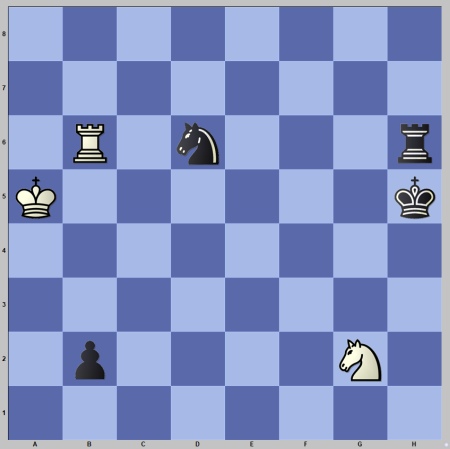 White to play and draw
White to play and draw
The tournament ran very smoothly, without any protests or complaints. The only thing to regret was the absence of the current champion of Finland, Dolf Wismann, who didn’t feel well and had to withdraw from the competition.
The copious dinner on Saturday evening was followed by a speed-solving tournament with 15 participants. It consisted of two rounds: first 12 two-movers (all with 14 pieces) in 30 minutes, then 12 studies in 30 minutes. The second stage looked daunting, but these were the final combinations of longer studies (“The Punch”, according to Yochanan Afek), and only the first move had to be given.
 Wine and books waiting on the table | Photo Luc Palmans
Wine and books waiting on the table | Photo Luc Palmans
Eddy Van Beers was extremely fast in the first round, solving all 12 two-movers in 27 minutes! In the second round kept his lead and emerged as the winner. The podium was completed by Richard Dobiaš and Dmitrijus Chocenka. The readers are kindly invited to try themselves, using one hour for this speed solving tournament.
The weekend finished on Sunday morning with a studies solving tournament organised by ARVES, the Dutch-Belgian society for endgame lovers. Two hours for six studies seems hard work, but traditionally the studies in this tournament are solver-friendly with clear main lines. The scores are always high, and the time factor can be decisive.
But not this time! Although the studies were much praised (after the tournament…), it was a significant challenge for everybody to score some points. Again, our readers may try themselves using the link above. Dmitrijus Chocenka was the winner with 15 out of 30 points, followed by Eddy Van Beers and Richard Dobiaš with 11, and then Dutchmen Wouter van Rijn and Harold van der Heijden with 10 points each.
The main hero of the Nunspeet competitions was the FIDE Solving Judge Luc Palmans. Can you imagine the amount of his volunteering work to select and prepare all 54 problems for four different competitions (bringing to the place some 700 copies)? And then running competitions, marking solutions, administration, reports, handling discussions… It is called the real love for chess composition!
Solutions:
1. Michael Herzberg, idée & form, 2016: 1.Rd4! (2.Rxd5#) The only proper defense is: 1…Kxd4 2.Rb4+ (2…Kxc5 3. Be7#) 2…Ke5, and now White can play 3.Bf5! because there is no dxc4 anymore. After the only defence to the double threat (4.gxf4# and 4.Nd7#) 3…dxe4 4.Bg6! white creates a new threat 5.Rxe4# Earlier, with 3.Bf5, white tried to close the lines of black pieces, and now, the black pieces will go to f5 themselves: 4…Rf5 5.Nd7#, or 4…Bf5 5.gxf4# – Grimshaw interference.
2. Virgil Nestorescu, 5th HM E. Dobrescu 80 JT 2014: 1.d3+ Kd4 2.Bg3! Ng4+ 3.Ke2 (3…Qc6 4.Kd2! +- and black cannot stop a checkmate without giving away his queen.) 3…Nf4+! 4.Bxf4 (the knight won’t reach square d5) 4…Qc6 5.Qa7+! Kc3 6.Qa3+ Kd4 7.c3+! Qxc3 8.Qd6+ Bd5 9.Qe5+! Nxe5 10. Be3#! White made three black pieces move and self-block, sacrificed a queen in the process, and finally checkmated black.
3. Mario Matouš, 2nd Prize Subotnyaya Gazeta, 1991: 1.Ka4! Nc4 2.Rb5+ Kg6 3.Ne3! (3.Nf4+? Kf7 4.Rb7+ Ke8 5.Rb8+ Kd7 6.Rb7+ Kc8 -+) Rh5 4.Rb3 Rh3 5.Nd1! Rxb3 6.Nxb2! Nd2! 7.Nc4! Rd3 8.Ne5+ Kf5 9.Nxd3 =
The next legs of the World Solving Cup 2022/23 will be the Open championships of Latvia (April 8), Serbia (April 29-30) and Lithuania (May 6-7).
Official website: wfcc.ch/


